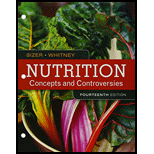
Bundle: Nutrition: Concepts and Controversies, Loose-leaf Version, 14th + MindTap Nutrition, 1 term (6 months) Printed Access Card
14th Edition
ISBN: 9781337127523
Author: Frances Sizer, Ellie Whitney
Publisher: Cengage Learning
expand_more
expand_more
format_list_bulleted
Concept explainers
Question
Chapter 8, Problem 6SC
Summary Introduction
Introduction:
Water balance in our body is maintained by the kidneys or by the brain. Both of these contain specialized osmoreceptors that detect any change in plasma osmolarity. Kidneys play a crucial role in drawing extra water from the body through the process of osmosis. Osmosis is regulated by levels of sodium and potassium in the blood and any altercation in these levels will either increase or decrease the blood pressure.
Expert Solution & Answer
Want to see the full answer?
Check out a sample textbook solution
Chapter 8 Solutions
Bundle: Nutrition: Concepts and Controversies, Loose-leaf Version, 14th + MindTap Nutrition, 1 term (6 months) Printed Access Card
Ch. 8 - Prob. 1RQCh. 8 - Prob. 2RQCh. 8 - Prob. 3RQCh. 8 - Prob. 1CTCh. 8 - Prob. 2CTCh. 8 - Prob. 1SCCh. 8 - Prob. 2SCCh. 8 - Water from public water systems requires frequent...Ch. 8 - Prob. 4SCCh. 8 - Prob. 5SC
Ch. 8 - Prob. 6SCCh. 8 - Vomiting or diarrhea causes fluid to be pulled...Ch. 8 - Which two minerals are the major constituents of...Ch. 8 - Prob. 9SCCh. 8 - Prob. 10SCCh. 8 - Prob. 11SCCh. 8 - The top food sources of zinc include a. grapes. b....Ch. 8 - Prob. 13SCCh. 8 - Which of these mineral supplements can easily...Ch. 8 - Prob. 15SCCh. 8 - Prob. 16SCCh. 8 - Prob. 17SCCh. 8 - Prob. 18SCCh. 8 - Prob. 19SCCh. 8 - Too little in the diet is associated with...
Knowledge Booster
Learn more about
Need a deep-dive on the concept behind this application? Look no further. Learn more about this topic, health-nutrition and related others by exploring similar questions and additional content below.Similar questions
- The body loses water by way of the ________. a. skin b. lungs c. digestive system d. urinary system e. both c and d f. a through darrow_forwardWhich of the following does not contribute to the process of filtration? (a) active transport by epithelial cells lining renal tubules (b) large surface area for filtration (c) low permeability of glomerular capillaries (d) high hydrostatic blood pressure in glomerular capillaries (e) podocytesarrow_forwardDrinking too much water can be a bad thing. If someone sweats heavily and drinks lots of water, their sodium levels drop. The resulting water intoxication can be fatal. Why is the sodium balance so important?arrow_forward
- Why is excretion important in order to achieve osmotic balance?arrow_forwardAs the text noted, two-thirds of the water and solutes that the body reclaims by reabsorption in nephrons occurs in the proximal tubule. Proximal tubule cells have large numbers of mitochondria and demand a great deal of oxygen. Explain why.arrow_forwardWhich of the following does not contribute to the high salt concentration in the interstitial fluid of the kidney medulla? (a) active transport of sodium from the upper part of the ascending limb (b) diffusion of salt from the ascending limb of the loop of Henle (c) reabsorption of salt from various regions of Bowmans capsule (d) counterflow of fluid through the two limbs of the loop of Henle (e) diffusion of urea out of the collecting ductarrow_forward
- Water and small solutes enter nephrons during ________. a. filtration b. reabsorption c. secretion d. both a and barrow_forwardFatty tissue holds the kidneys in place. Extremely rapid weight loss may cause this tissue to shrink so that the kidneys slip from their normal position. On rare occasions, the slippage can put a kink in one or both ureters and block urine flow. Suggest what might then happen to the kidneys.arrow_forwardThe fine tuning of water recovery or disposal occurs in ________. a. the proximal convoluted tubule b. the collecting ducts c. the ascending loop of Henle d. the distal convoluted tubulearrow_forward
arrow_back_ios
arrow_forward_ios
Recommended textbooks for you
 Human Biology (MindTap Course List)BiologyISBN:9781305112100Author:Cecie Starr, Beverly McMillanPublisher:Cengage Learning
Human Biology (MindTap Course List)BiologyISBN:9781305112100Author:Cecie Starr, Beverly McMillanPublisher:Cengage Learning- Essentials of Pharmacology for Health ProfessionsNursingISBN:9781305441620Author:WOODROWPublisher:Cengage
 Human Physiology: From Cells to Systems (MindTap ...BiologyISBN:9781285866932Author:Lauralee SherwoodPublisher:Cengage Learning
Human Physiology: From Cells to Systems (MindTap ...BiologyISBN:9781285866932Author:Lauralee SherwoodPublisher:Cengage Learning Comprehensive Medical Assisting: Administrative a...NursingISBN:9781305964792Author:Wilburta Q. Lindh, Carol D. Tamparo, Barbara M. Dahl, Julie Morris, Cindy CorreaPublisher:Cengage Learning
Comprehensive Medical Assisting: Administrative a...NursingISBN:9781305964792Author:Wilburta Q. Lindh, Carol D. Tamparo, Barbara M. Dahl, Julie Morris, Cindy CorreaPublisher:Cengage Learning


Human Biology (MindTap Course List)
Biology
ISBN:9781305112100
Author:Cecie Starr, Beverly McMillan
Publisher:Cengage Learning


Essentials of Pharmacology for Health Professions
Nursing
ISBN:9781305441620
Author:WOODROW
Publisher:Cengage

Human Physiology: From Cells to Systems (MindTap ...
Biology
ISBN:9781285866932
Author:Lauralee Sherwood
Publisher:Cengage Learning

Comprehensive Medical Assisting: Administrative a...
Nursing
ISBN:9781305964792
Author:Wilburta Q. Lindh, Carol D. Tamparo, Barbara M. Dahl, Julie Morris, Cindy Correa
Publisher:Cengage Learning